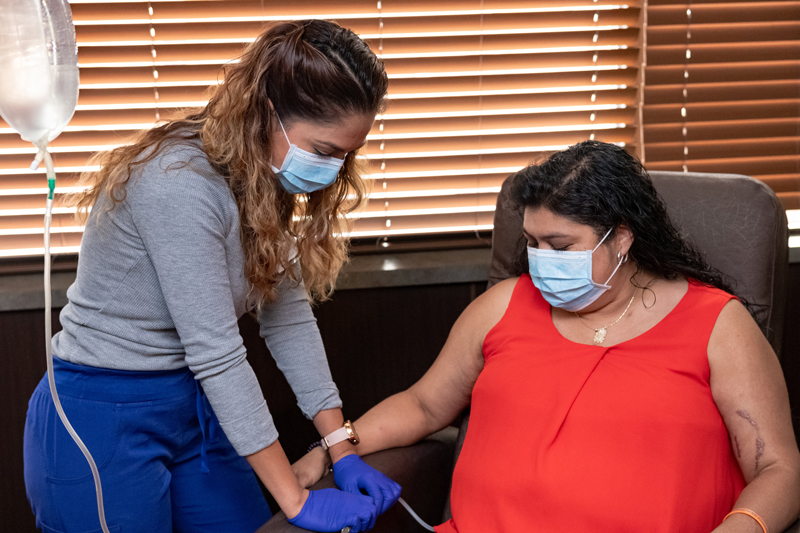Dialysis In-Center
If you have been diagnosed with end-stage or chronic kidney failure, then you only have two treatment options. You can either rely on a kidney transplant as your long-term treatment option, or you can do the same for dialysis.
Many people often think that dialysis is an uncomfortable and depressing situation. Though, this couldn’t be further from the truth.
If you want to move forward with dialysis treatment, then you can have your treatment performed at a specialized center.
Do you want to learn more about how this can take place? Below are some frequently asked questions about in-center dialysis and how it can affect your condition.
Where Will I Go for Dialysis?
There are two major types of kidney dialysis: peritoneal dialysis and hemodialysis. Ultimately, you and your doctor will decide on which treatment is right for you.
If you choose to perform your dialysis treatment at home, you and a partner will be trained on how to do so. Otherwise, you can select in-center treatment options that will include: in-center self-care dialysis and in-center nocturnal dialysis.
Traditional in-center dialysis is performed at least three days a week, and about four hours per treatment, by a healthcare professional.
During self-care dialysis, you and your partner can be trained on how to perform part or all of your treatment. If you select this option, you’ll still be required to perform your treatment at least three days a week, and about four hours per treatment.
Conversely, in-center dialysis is performed by a dialysis technician in a facility overnight for at least six hours while you sleep.
Dialysis has evolved to accommodate every aspect of your life. Consult with your doctor today to learn more about if in-center dialysis is right for you.
Is In-center Right for Me?
Of course, you’ll have the option to select which form of dialysis treatment you want. However, your doctor will determine which option is right for you based on your medical condition. In-center dialysis is the most common form of kidney treatment. Therefore, it’s very likely that this will be the option for you.
If you want to continue working or want to maintain an active lifestyle, then you can elect to perform home dialysis. Your doctor will have to evaluate your medical condition to determine if home dialysis is right for you. Again, it’s not for everyone.
Do I Have a Choice Where I Take Dialysis?
Yes. In many cases, depending on your insurance provider, you have the freedom to choose a dialysis center. You can also change the facilities if you aren’t satisfied with the one you’re going to. However, changing facilities often means you’ll need to change your nephrologist as well. If you’re like most people, you’ll select a facility that’s conveniently located where you live or work.
Being in close proximity to your dialysis center will ensure that you can easily take your treatments during your schedule.
If you require a flexible treatment schedule, having a dialysis center close to your home is ideal.
Can I Tour a Dialysis Center First?
Yes. Taking a tour of a prospective dialysis center is a great idea. If you’re going to be paying for your treatments and spending much of your time at a facility, it’s best to choose a center you like.
With that said, you can request a tour and meet the professionals who will be taking care of you. If you want to take a tour at a renowned kidney care facility in South Texas, give us a call at (210) 212-8622.
What Questions Should I Ask During a Tour?
Every dialysis center is different. Practices and policies can even differ at various dialysis center locations of the same company. Some facilities will schedule your treatments to accommodate your family obligations and job, while others won’t.
Some facilities will allow patients to eat during their treatments, while others won’t. Some facilities may have exercise programs, educational resources, and internet access, and others won’t.
To select the dialysis center that’s right for you, you may need to write up a list of questions based on your preferences.
Since you aren’t assigned a dialysis center randomly or forced to visit one you don’t like, do your due diligence in finding the facility that tailors to your needs.
Can My Family and Friends Come With Me?
It depends. This policy may vary depending on the center. Under privacy rules, you’ll need to sign a form to allow certain family or friends to be with you during your treatment.
Many centers will allow one visitor to be with you during treatment, but large groups are often discouraged because they may take up too much room and cause a commotion.
For this reason, it’s important to speak with your center’s healthcare team to see if something can be arranged for you if you require visitors.
How Does Nocturnal Dialysis Work?
One of the best things about in-center dialysis is that you can take your treatment at night. Like home dialysis, you can receive treatment while you sleep.
During the night, patients typically go to their center around 8:00 p.m. and are placed on the dialysis machine. They are able to bring a book to read, watch T.V, bring their dinner, listen to music, or participate in any other activity.
Patients are encouraged to bring their blanket, pillow, toothbrush, and any other items to make them feel comfortable. At around midnight, the lights are turned out.
The patients can either go to sleep or continue on with their activities without disturbing their neighbors. Before 6:00 a.m., patients are taken off dialysis and are able to start their day.
Many people state that nocturnal dialysis is more relaxing and peaceful. Also, patients are able to spend more time interacting with others, which can lead to the build-up of quality support systems.
Is In-center Dialysis Right for You?
In-center dialysis is the most common form of kidney disease treatment, but is it right for you? If you have any questions, please call us at (210) 212-8622 today.

